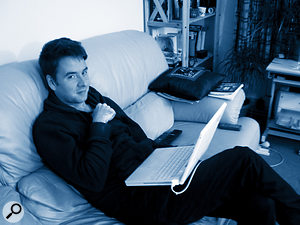Learn to listen...
It was the mid‑'90s and I was doing the sound-recording module of my music degree. The module was excellent and remains one of the highlights of my time at university. Much of what I learned then I still use now, and while I didn't really understand the subject in those days, in the years since, the information has slowly fallen into place. The thing that has taken me the longest to fully understand is something I was told early on, which seemed to me a somewhat enigmatic piece of advice; 'What you really need to do is use your ears...'
On the face of it, this suggestion just seemed too simplistic. Yes, it summarises much of what engineers do, but surely there's more to it, some secrets and tricks, some magic formulae, some ancient runes passed down over time? Well, yes and no. The problem with this statement is that it assumes we actually know how we use our ears. I had always listened closely to other peoples' music, but for years my mixes left a lot to be desired. Was this because I fundamentally did not know music, or had I just not been listening 'enough'? Surely there must be something missing here...
Although (if we are lucky enough to have all of our hearing intact) we're all physically listening in the same way, this doesn't mean that we all hear the same thing. Anyone who has ever worked with a really good engineer will know that this is clearly not the case. You both may be listening to the same material, but one of you is hearing far more information than the other.
The whole matter is further confused by the fact that we often equate musicality with 'having a good ear', when in fact there are two separate issues. There is hearing the musical elements of a performance, and then there is hearing the physical content of the sound. We often assume that someone who understands either element should understand the other.
Some very gifted people have a sense of what constitutes a really good sound locked in their aural memory banks from the start, but for many of us it is something that needs to be consciously learned. For most musicians, there is always enough to be paying attention to, so unless the quality of the sound is your prime responsibility, you often only give it a modicum of your aural attention. I was amazed when I started to realise that some samples that sounded OK by themselves didn't work in the music that I was trying to use them for, or that some combinations of drums just wouldn't fit together. After all, they all sounded like proper drums to me...
The truth was that I had never really paid them enough attention. I hadn't needed to, in order to appreciate music. I had been concentrating on trying to hear the melody, understand the harmony and enjoy the basic expressive quality of the music.
This actually sounds like more or less what the guy said, so what's the big deal? Well, the thing is, it's not just listening alone, as there is no context. You need to listen to your sounds and compare them with other ones and see how they relate, or differ.
You must teach yourself where to locate different sounds on a spectral map and what it is that defines them and gives them their position. You are creating your own memory banks, so that in future you know how to accurately produce the noises that you want to hear. Until you know what really makes something as it is, you have little chance of reliably reproducing it. You might sometimes get there but it's going to be hit and miss.
This may sound very clinical and cold, and at odds with what we see as the 'artistic' process, but isn't it what most people do anyway, either consciously or unconsciously? Those destined for engineering superstardom are the ones who learned what everything 'really' sounds like early on, but even skilled engineers come up against these issues and need reference material to maintain context.
So, in the end, you really do need to use your ears... But your ears are pretty powerful tools and it takes a lot to get the most out of them. It's unlikely to happen overnight. The positive side is that even while you're developing them, you can still be a good musician, making a lot of very valid music. Thus endeth the lesson...
About The Author
Amos Deane writes music (www.halflightmusic.co.uk), teaches music technology and grapples with IT support issues, although not always in that order...

